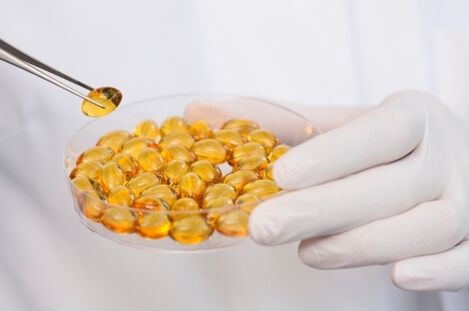What is lipoic acid? It is a light yellow powder with a bitter taste that can easily be confused with hundreds of other chemicals. However, the unique qualities of an unusual combination of fatty acid and sulfur make you pay special attention to lipoic acid: it promotes weight loss, gives the body extra energy, protects the brain and is probably the key that will open the door to humanity in the countryof eternal youth. . . Intrigued?

Lipoic acid is known to increase the effectiveness of weight loss exercises at times. How else can it help the body?
Lipoic acid: cleanser or special forces?
Lipoic acid, also known as LA, is also thioctic acid, it is also lipamide, it is also vitamin N, which often appears as a semi-vitamin or vitamin-like substance.
The fact that LA is synthesized by the human body prevented it from becoming a "complete" vitamin. It is also interesting that lipoic acid is soluble in both fat and water, while its other counterparts in the "vitamin activity" can boast only one convenient habitat.
Lipoic acid is real Figaro: it is here, it is there. Accompanying the enzymatic reactions in the mitochondria, it helps to make the process of obtaining energy from cells as efficient as possible.
Lipoic acid molecules - miniature recycling plants. The substance "collects" the breakdown products of amino acids and allows you to squeeze out of them the absolute maximum of the substances our body needs, and then removes all the "waste rock" from the body.
In recent years, doctors have begun to talk seriously about lipoic acid as a future elixir of eternal youth, because it is this substance during experiments proved its ability to prevent DNA damage, which is recognized as the real cause of cellular aging and loss of vital functions.

Lipoic acid and weight loss: why it works
Lipoic acid is able to "tame" the forces that make us gain weight and retain excess fat. Its activity in this capacity is multifaceted. So, when you lose weight, lipoic acid:
affects the areas of the brain responsible for appetite, reducing hunger;
stimulates energy consumption;
increases insulin sensitivity;
qualitatively improves the absorption of glucose by cells by reducing its level in the blood;
reduces the tendency of the liver to accumulate fat.
Practice shows that lipoic acid gives the best results in weight loss in combination with changes in diet and physical activity. There is a logical explanation for this. During the "change in the course" of the diet, chemical changes occur in the body (most pronounced when following a protein, paleo or keto diet, which give the fastest result and the most noticeable side effects), and with increased strength and cardio exercise, microtraumaappear in the muscles.
Therefore, oxidative processes in the body are intensified, which leads to a "jump" in the formation of free radicals, damaged molecules.
Thus lipoic acid is able not only to neutralize them, but also to absorb them, and then - to recover and rush back into the antioxidant battle.
This is another unique quality of lipoic acid: it is the only reusable antioxidant.
In addition, vitamin N is friendly: lipoic acid is able to cooperate with other substances that fight free radicals (vitamins C and E, as well as glutathione) and even enhance the action of its allies.
Is alpha lipoic acid the first?
For the first time, researchers were able to extract lipoic acid from beef liver cells in the 1950s. Therefore, alpha-lipoic acid for weight loss begins its "medical career" as a hepatoprotector. However, scientists have begun to discover more and more new properties of an amazing substance and have also learned to synthesize it quite well in the laboratory.
Today, chemists produce for different purposes two chemical "mirror" variants of lipoic acid - R ("right isomer") and S ("left isomer"). There are some differences in their molecular composition and the human body efficiently and almost completely absorbs only R-type lipoic acid.
The latest methods allow to achieve greater purity of the drug and a high concentration of R-lipoic acid. It is clear that such a substance has great potential for all the properties inherent in LA; in addition, it has been experimentally proven that the R-isomer increases the sensitivity of cells to insulin. However, the production of pure R-variant of the substance is quite expensive, which, of course, affects the price of the product.

The most popular has become the more accessible alpha-lipoic acid, in which the "right isomer" and the "left isomer" are in equal proportions.
Products containing natural lipoic acid
Offal: kidneys, heart, liver;
Vegetables: broccoli, spinach, Brussels sprouts, peas, tomatoes;
Other sources: brewer's yeast, brown rice.
When your strength is not enough
Many living organisms (including humans) are able to synthesize a certain amount of lipoic acid on their own - this explains the fact that high concentrations of this beneficial substance are found in the internal organs of animals.
Alas, you don't have to rely entirely on LA's food sources: as American nutritionist Dr. Jeffrey Webb explains, our enzymes are unable to break the link between alpha lipoic acid and the amino acid lysine, whichlipoic acid surrounds the gastrointestinal tract in the form of food, so from a dinner rich in ALA, we will get only crumbs of the valuable substance.
The question arises: if people are able to produce only a modest amount of lipoic acid, and with food they can get even less, as we have lived so far, until doctors learn to synthesize it?
The answer is simple: those happy organisms that do not suffer from metabolic disorders, are not prone to obesity and have not accumulated a whole load of free radicals, are fully capable of dealing with the amount of free alpha-lipoic acid, which is. the environmental situation and the rapid deterioration of eating habits in the 21st century have brought lipoic acid from the shadows to the forefront.
If you need the help of a substance that is both an antioxidant, water- and fat-soluble vitamin, a stimulant of lipid metabolism and as a bonus, a protector against degenerative brain diseases - discuss with your doctor the possibility of taking additional alpha-lipoic acid as a dietary supplement.
Lipoic acid: how much to take
The standard recommendation that your doctor may give you for alpha-lipoic acid as a supportive and tonic is 25 to 50 mg per day. But it can vary depending on the purpose of use of the vitamin-like substance and the health of the "host".
Those who practice increased sports load for weight loss may be prescribed to "eat" 100-200 mg of alpha-lipoic acid, often as part of complex preparations that also contain L-carnitine (levocarnitine). LA enhances the effect of "fat burning 'of this natural anabolic.
It should be remembered that such supplements are taken in strictly time-limited courses, so as not to "accustom" the body to the constant intake of substances that stimulate metabolism and not cause a withdrawal syndrome, characterized by the body's refusal to produce thesesubstances on their own.
Because lipoic acid has the ability to maintain the action of insulin and even partially take over its functions in some processes and reactions, diabetics are often prescribed higher doses of 400 mg of LA per day.
Renowned neurologist David Pearlmouth, author of The Brain Nutrition Diet, believes that 600 mg of alpha lipoic acid is a must for anyone interested in preventing neurodegenerative diseases and clearing up the effects of years of fast-carb abuse.
In recent US experiments, alpha-lipoic acid, taken at a dose of 1800 mg per day for 20 weeks, helped to lose 9% of body weight without changing the diet in patients with severe obesity.
In case you decide to spend money on the more progressive and expensive R-isomer of lipoic acid, the dose should be halved due to its high bioavailability.
It should be noted that for all the benefits of lipoic acid, its overdose can cause indigestion and nausea, increased skin sensitivity and muscle pain, as well as a sharp drop in blood sugar levels with all the accompanying "surprises" such as weakness, dizzinessworld hunger and great hunger.
So be sure to consult your doctor before going to the pharmacy for a huge box of lipoic acid for rapid weight loss: a specialist will help you determine the dose that is effective and safe for you, your slimness and your health.
During the entire period of lipoic acid intake, alcohol is strictly contraindicated. For best absorption, the supplement should be taken 60-30 minutes before a meal or at least an hour after a meal.
Noticeable and tangible results from the intake of the substance appear not earlier than eight weeks.

































